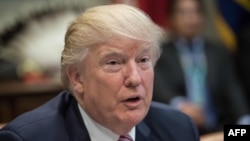President Donald Trump voiced optimism Wednesday that fractious Republican senators would be able to reach agreement to overhaul national health care policies, but he concedes it will be "very tough."
"I think we’re going to get at least very close, and I think we’re gonna get it over the line," Trump said. He offered his assessment the day after Senate Republican leader Mitch McConnell dropped plans to vote this week on a Republican proposal to dismantle much of the seven-year-old U.S. law popularly known as Obamacare — former President Barack Obama's signature domestic legislative achievement.
Republican leaders and their colleagues huddled in their U.S. Capitol offices to discuss changes to McConnell's proposal, looking to craft new provisions ahead of next week's Independence Day recess, and then vote on it when lawmakers return to Washington the following week.
But reaching a compromise remains difficult, with nine of the 52 Republican senators opposing various parts of the plan. Some are against it because they think it would curb by too much spending for the government's health program for the poor, and others alternatively because they believe the proposed changes do not go far enough to undermine Obama's law.
“Legislation of this complexity almost always takes longer than anyone would hope. But we’re pressing on," McConnell said Tuesday after dropping plans for a vote this week as he had hoped.
An independent analysis of the Republican plan by the Congressional Budget Office concluded this week that 22 million people would lose their health insurance over the next decade compared to Obamacare. But Trump said the Republican plan "will be great for everybody."
He said the Republican proposal "would be so good, would be far better than Obamacare, and would be much less expensive for the people, and actually much less expensive also for the country. So those are a lot of good factors.”
National surveys show Obamacare winning new popularity even as Republicans try to keep their campaign pledge to get rid of it. Meanwhile, several polls show that Americans do not like the Republican proposal.
Quinnipiac University on Wednesday said its survey in recent days shows U.S. voters, by a 58-16 percent margin, disapprove of the Republican plan. The survey shows that Republicans favor the legislation by a 37-23 percent edge, but there was overwhelming opposition from every other identity group, whether it was by political party, gender, education, age or racial group.
"Call it a dressed-up retread of the last [Republican] health care plan, or simply a wolf in sheep's clothing," said Quinnipiac pollster Tim Malloy. "Americans aren't buying this latest version of the plan to kill Obamacare."
Senate Republicans hold a 52-48 majority in the Senate. With all Democrats opposed to repealing the existing law, Republicans can lose only two supporters in order to pass their proposal, with Vice President Mike Pence casting the deciding vote in the event of a 50-50 deadlock.
The House of Representatives last month passed its version of the health care overhaul, a measure that Trump at first celebrated with Republican lawmakers at a White House rally, only to later call the legislation "mean."
He has said he wants "heart" in the Senate plan.
Both the House and Senate proposals would end the requirement that Americans buy health insurance or pay a fine. It would phase out subsidies to help lower income people buy insurance, curb taxes on the wealthy, and cut hundreds of billions of dollars in funding over the next several years for the government's health care program for the poor and disabled.













